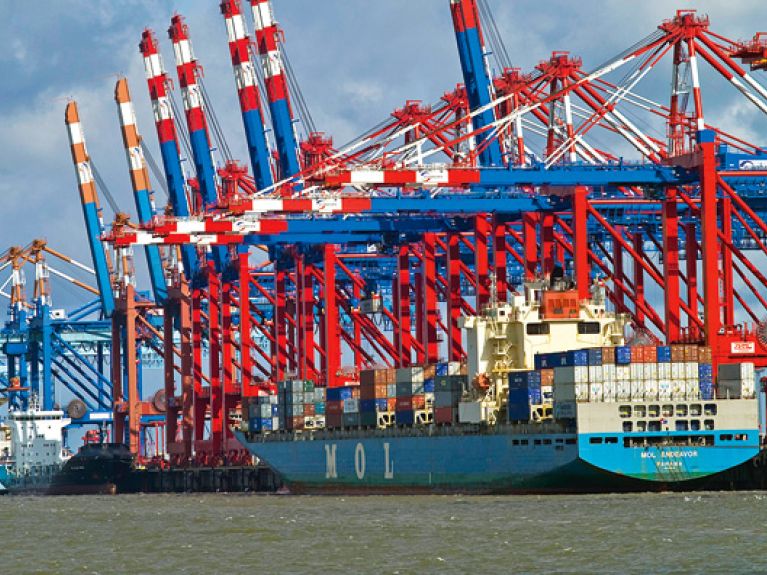Trading partners coming together
The planned free trade agreements between the EU and North America aim to enable great future opportunities.

Some objectives have already been put in writing, for example, maintaining good working conditions and protecting natural resources. Concerning other topics the negotiators are still working on aligning their different systems more closely – for example, the public tendering processes organized by cities and municipalities. “We are working on ironing out the differences in our ways of thinking,” reads the report of 29 July 2014, which outlines progress on the Transatlantic Trade and Investment Partnership (TTIP).
Since July 2013 the EU and the United States have been engaged in negotiations on the agreement destined to facilitate the free movement of goods and services between the world’s two largest economic powers. Customs tariffs are to be abolished, double standards harmonized and investments facilitated. It is an ambitious and complex plan – but in principle possible, as evidenced by the discussions between the EU and Canada on a free trade agreement. The latter is called the Comprehensive Economic and Trade Agreement, or CETA for short, and the EU and Canada celebrated the conclusion of negotiations in September 2014. This should also help the TTIP negotiators.
However, the structures and above all the scale of trade are different. The United States is Europe’s most important trading partner by far. More than 18% of all EU exports go to America, twice the amount that goes to China. By contrast, Canada is in 12th place on the list of EU trading partners. For this reason alone, CETA can only to a limited extent serve as a template for TTIP. Moreover, there is considerable resistance to the negotiations. More than 240 organizations, spanning the critics of globalization at Attac to citizens’ initiatives, have joined together to form an alliance called “Stop TTIP” and are attempting to register as a European Citizens’ Initiative. The European Commission rejected their application in September 2014, but the alliance is appealing against the decision. Stop TTIP calls for the negotiations on CETA and TTIP to be discontinued. This is based above all on the concern that European achievements, such as state healthcare and environmental and social standards, could be diluted in favor of commercial interests. There are however reservations on both sides of the Atlantic. In Germany, for example, the controversial American “chlorinated chicken”, which is controversial owing to the method of disinfection used, has been well documented in the press. Americans for their part fear “live” raw milk cheese from France. TTIP could present an opportunity to test different philosophies – and if necessary exclude them from negotiations. Dietmar Rieg, President of the German American Chamber of Commerce in New York, considers the debate good: “The objective should be orientation toward the standards that offer the best protection.”
Despite the reservations, the chances of an agreement succeeding are apparently not so bad. United States Trade Representative Michael Froman is said to have been optimistic that TTIP will be concluded in this legislative term. In Germany too several skeptics are coming round to the idea that a well negotiated agreement will offer more advantages than disadvantages – also as a template for future agreements, for instance with Asia. Only recently, the German Federation of Trade Unions changed its negative stance toward TTIP to cautious support. The partnership could “help advance fair and sustainable trade regulations on a global basis,” it stated in a position paper. Other EU countries have fewer concerns anyway; many see TTIP as an important instrument to boost their economies. These expectations are justified. According to calculations in a study by the London-based Centre of Economic Policy Research (CEPR), EU gross domestic product would increase by 120 billion euros a year and that of the United States by 90 billion euros as a result of the trade facilitations.
Numerous economists are convinced that free trade not only benefits companies, but the entire economy – employees, with jobs created by the additional economic dynamism, and consumers, because prices fall. However, the anti-TTIP alliance fears that the true beneficiaries will be others. In one appeal it claims: “In reality it is not the people who benefit, but the big companies.”
In reality, companies hope that TTIP will make things easier. “Why does the rearview mirror of a tractor in Europe need to have a different curvature to one in America?” asks Martin Richenhagen, the German head of the U.S. manufacturer of agricultural machinery AGCO. His company, represented in Germany with the subsidiary Fendt, would save many millions of dollars as a result of the free trade agreement – if only because new machines would not require so many parts to be developed in two different versions. And when tractors and combine harvesters are cheaper for farmers to buy, food can become cheaper in stores.
It is not only large companies that will benefit, but also SMEs on both sides of the Atlantic, such as export-oriented German engineering companies. They can expect the greatest advantages owing to the dropping of customs tariffs and bureaucracy – and arguably also regarding a highly controversial topic in Germany, namely investor protection. The issue at hand is that firms can refer to international arbitration courts if they believe that a state is not honoring promises on which an investment decision was based. The regulation, included in numerous trade agreements since the 1950s, can save companies costly litigation against public authorities. Opponents of TTIP on the other hand fear an undermining of the rule of law when problems cannot be resolved in ordinary court proceedings.
The question is, to what extent investor protection is necessary at all. “We need free trade,” stated German Economics Minister Sigmar Gabriel back in spring 2014, “but we do not need investor protection regulations that derail our jurisdiction. Arbitration proceedings may be meaningful where there is no functioning rule of law, but in the EU and the United States that is certainly not the case.”
The European Commission provides updates on the status of the free trade negotiations on its website. But there is one thing that remains to be discussed: namely, the negotiating mandate, which especially TTIP skeptics wish to see. All member states would need to consent. Many, however, do not see at all why they should do something on a political level that a private individual would not even dream of doing when buying a car, namely revealing his own strategy to his trading partner. ▪
Christine Mattauch

